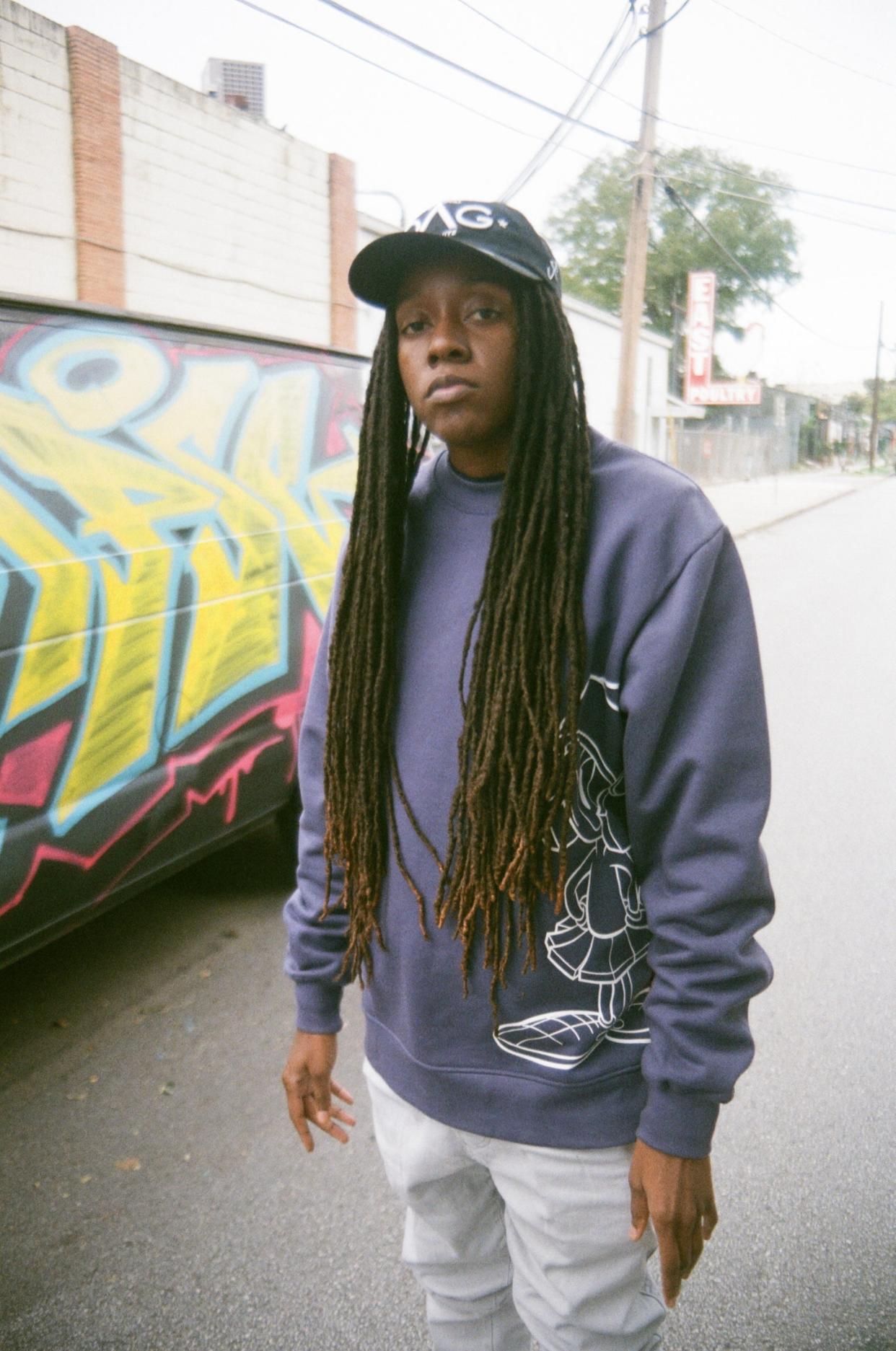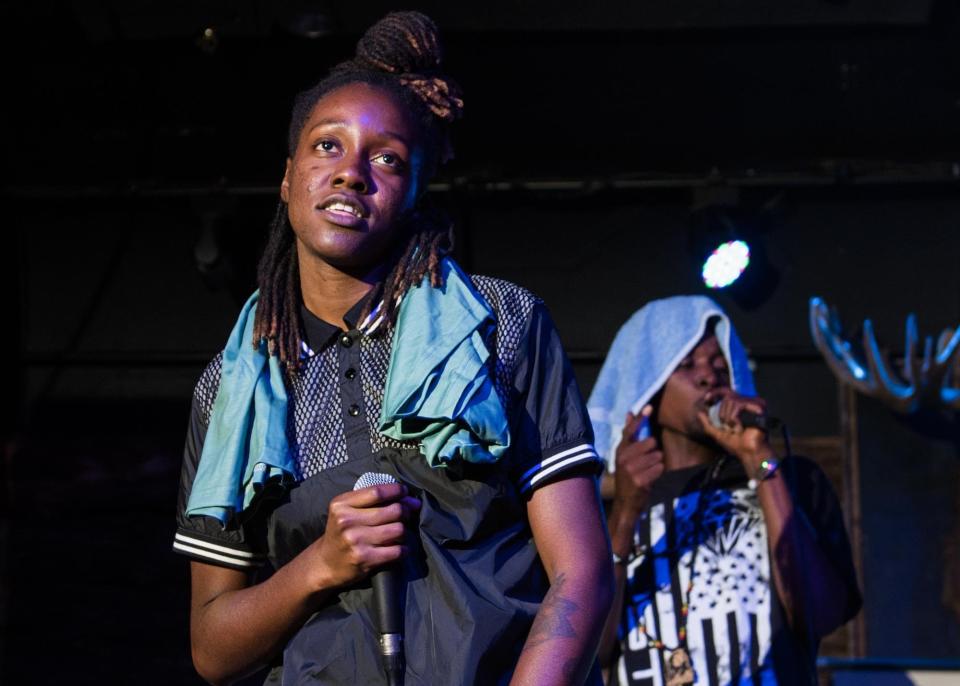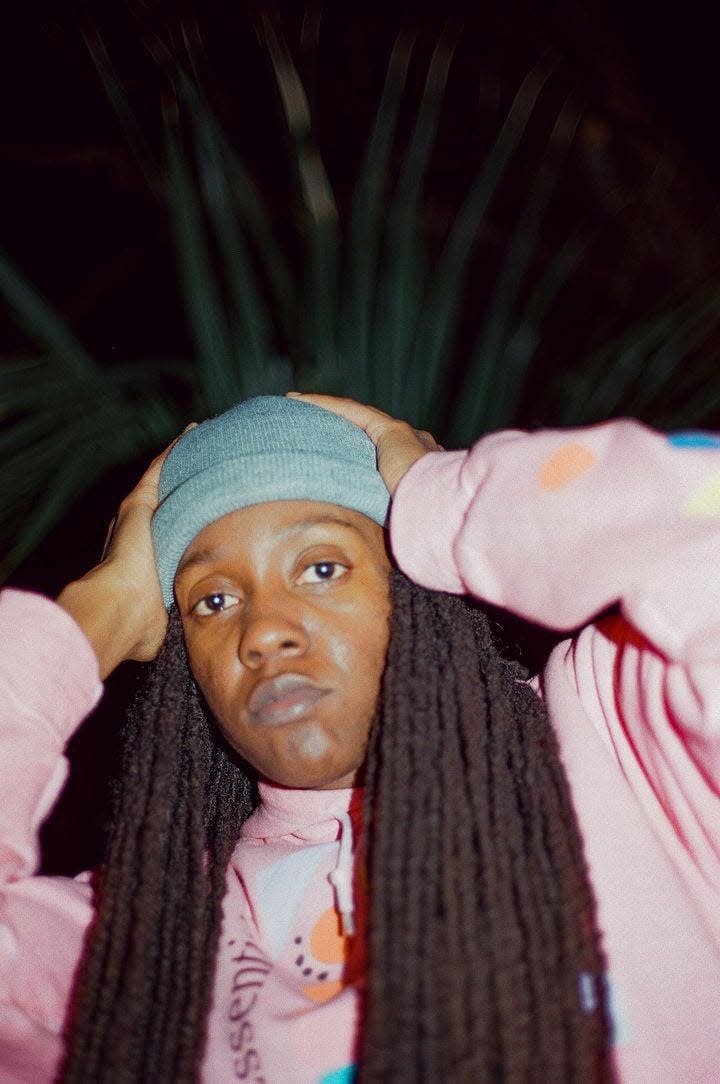Blakchyl's new EP is a summery splash of queer sensuality. Hear it live at Waterloo Records

Blakchyl’s new single “White T Shirt” tempers Texas heat with a splash of ice cold swagger.
“All the Black girls wit the white tee shirt/ couple shots won’t hurt/ She want me, I want her,” she purrs on the sing-song hook. The boozy lust of the chorus frames a steamy whisper-rap ode to summer hook-ups, sneaky links and queer Black and brown love.
Singing over a sexy groove is a swerve for the rapper a.k.a. Teaunna Moore, who is best known around town for spitting street wisdom with aching vulnerability. But while she came up in the activist school of hardcore hip-hop, pop stars like Britney Spears, the Spice Girls and NSync were also part of her upbringing.
Working on this album, she kept TLC’s “Fan Mail” on repeat. She tried to emulate the cool sex appeal of Tionne “T-Boz” Watkins, reimagined for the queer dance club.
“I like going to queer shows and Vogue shows,” she says. The question that guided this release? “How can I make that soundtrack, but still be me.”
Her new EP “Call Me Sometimes” dropped Tuesday, in time for Pride.
Moore will play the biggest stage in town later this year at Austin City Limits Festival, but you can celebrate the new release at the next installment of The Drop, our free live music series at Waterloo Records, on July 5 at 5 p.m. Co-produced by KUTX 98.9FM, the Drop showcases a diverse selection of artists who keep Austin’s music scene live.
More: Austin's Trouble in the Streets creates dance music that will make you cry

The Cipher transformed aspiring rappers into community leaders
As a child, Moore rapped along to hip-hop hits on BET’s “106 & Park,” performing to an audience of teddy bears on the couch. She became serious about rap after she met her first mentor Gator Ogletree during her freshman year at Reagan High School. When she was a sophomore, Ogletree, along with social worker Shannon Cole Sandrea, founded a nonprofit called the Cipher that used the culture of hip-hop to foster artistic growth and build life skills and community for underprivileged youths.
“It’s just so funny that I just really never left the Cipher,” Moore says. “It's hilarious. Like, I really thought that I was going to go, like, for a few days.”
For a core group of students, the Cipher became both an intense training program and a safe space to learn and grow. The students were coached by community leaders including theater artist Zell Miller and performance poet and rapper Jeffrey Johnson a.k.a. Da’Shade Moonbeam. Johnson applied a hip-hop bootcamp approach to rap performance, making the young artists do pushups whenever they missed a word in rehearsal.
Before mental health and self-care were openly discussed in popular culture, Sandrea included a therapeutic component to the group’s after school meetings. Sometimes the students would talk for hours, blowing past their allotted session time. Sandrea and Ogletree provided food and “sometimes that was some people's only meal of the day,” Moore says.
The Cipher booked gigs performing at nonprofit galas and other community events. As much as Moore feels “blessed” by the opportunities the Cipher offered her, she also believes it “was refreshing for the city to see these inner city kids, making (their) path together.”
They were “still in high school at the time and just growing to be leaders,” she says.
When she graduated from high school, Moore and three of her fellow Cipher rappers formed the hip-hop crew Mindz of a Different Kind. The group has released three excellent full-length albums and toured France three times, most recently in 2022.
On the French trips, centered around Austin’s sister city Angers, they mix evening club shows with sessions at schools. In the Cipher’s unbroken circle, they use the language of hip-hop to teach French youth to express themselves in English.
More: Urban Heat will delve into darkness and dance us into the light

A sensual celebration of queerness that the ACL Fest crowd will love
Moore came of age in the “bitches and hos” era of late ‘00s, early ‘10s hip-hop. It was a difficult time for women in rap and an abhorrent age for queer artists. The Cipher provided a safe space to come out and come into herself, but gender identity is complicated and “I still was just trying to find my way in it,” she says.
“Just trying to live up to the other studs that I was already seeing in high school,how they were carrying themselves like super macho, I was like, ‘Dang, I ain't ready for all that,’” she says with a laugh.
On the hip-hop scene, while there have been “femme-presenting (rappers) since the beginning of time,” there weren’t a lot of women coming out of the East side of town, or anywhere, for that matter, that looked like Moore, she says.
She never felt pressured to move into the scantily clad sexy lane, but knowing it was the fastest path to success for many female rappers was “discouraging,” she says. Once you get past the ‘90s, it’s hard to identify masculine-presenting women in hip-hop who made it out of the underground.
Even back in hip-hop’s golden years, artists like Queen Latifah and Da Brat “were just like wearing big clothes. Maybe they liked women, we don't know,” Moore says. “I feel like that's what kind of makes me just represent who I am even more.”
Again, gender identity is complicated, and on the new release Blakchyl explores the full spectrum. “Getting to know myself even more with each album or outside of making music, I just feel like I've always been in touch with my feminine side,” she says.
At times this confused “other masculine-presenting (women) or even femmes that I would date,” she says. “I just felt awkward coming up.”
On “Call Me Sometimes,” she balances cool femininity on the hooks with the more masculine energy of her signature rugged raps. The result is a smooth platter with club energy and summery vibes. In the wake of escalating attacks on LGBTQ rights in the Texas legislature, its a sensual celebration of queerness which feels essential. It’s also a hot sound that will sound good on the big stage at ACL Fest later this year.
Blakchyl is nervous but excited for her solo spot on the big stage during Austin’s namesake festival, an event she’s never attended. She’s excited and grateful, ready to step forward and claim her moment.
“I just feel like it’s time,” she says.
This article originally appeared on Austin American-Statesman: Austin's Blakchyl to play a free show at Waterloo Records for The Drop

